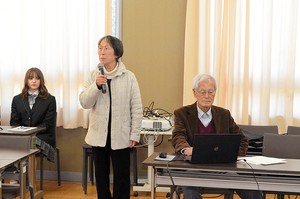THE ASAHI SHIMBUN
January 19, 2024 at 17:35 JST
The Noto Peninsula earthquake has hammered foreign technical interns in Ishikawa Prefecture, and concerns are rising about their futures in Japan and the survival of their understaffed employers in the region.
Many of the thousands of foreign trainees in the prefecture are now living as evacuees and struggling against cramped and unsanitary conditions as well as the language barrier.
Training sites remain damaged, and the foreign workers have been unable to earn money.
A 22-year-old Indonesian intern who returned from an evacuation center to a company dormitory near Ogi Port in Noto town explained what he went through.
He said he was playing a video game with his Indonesian friends at the dormitory on New Year’s Day.
Suddenly, the ground started to shake, and the TV, a dryer on a shelf, and other items fell over.
“I’ve never felt such a big earthquake before,” he said.
After a tsunami warning was issued, he and the other trainees fled to an elementary school on higher ground and spent a week at a nearby junior high school as evacuees.
No one at the evacuation center spoke Indonesian, so they had difficulty explaining their needs and circumstances. Even after they returned to their dormitory, they struggled to understand the information in Japanese about relief supplies.
The man works on a medium-sized squid fishing boat that belongs to Ogi Port.
He came to Japan in 2022 to support his family after his father passed away. The intern has sent money to Indonesia every month to help his family buy food and cover his sister’s school fees.
He dreams of starting his own business but is now uncertain if he will be able to continue fishing from Ogi Port.
According to the Immigration Services Agency of Japan, 18,302 foreign nationals lived in Ishikawa Prefecture as of June 2023, including 4,637 technical interns and 2,019 “specified skilled workers.”
More than half of the companies in Ishikawa Prefecture that employ foreign workers have payrolls of fewer than 30 people, according to the Ishikawa Labor Bureau.
Many of these companies are in the manufacturing and fishery industries, which are suffering from labor shortages.
Ogi Port, one of the three major squid fishing ports in Japan, along with Hakodate in Hokkaido and Hachinohe in Aomori Prefecture, is representative of the problems facing Ishikawa Prefecture.
In recent years, catches at Ogi Port have been less than 10 percent of peak levels, as fishing boats have had to operate with depleted crews.
Many technical intern trainees now work at the port, essentially saving businesses there.
“We can’t operate the boats without the trainees,” Hirokazu Bando, a senior member of the prefectural fisheries cooperative association’s Ogi branch, said. “I hope the earthquake doesn’t prevent them from coming here.”
Nguyen Thi Ly, 41, a technical intern from Vietnam, worked at a sewing factory in Suzu in the prefecture.
The quake damaged the factory, and Nguyen has been unable to resume work there. Nguyen will move to a factory in Toyama Prefecture to continue working.
The Nagoya Regional Immigration Services Bureau on Jan. 18 held a consultation meeting for foreign workers in Kanazawa, the capital of Ishikawa Prefecture.
A foreign student from Thailand made an online appeal at the meeting: “My place of stay in Wajima was damaged by the earthquake and I cannot return.”
The meeting was held in cooperation with a local nonprofit organization that supports foreign nationals. Consultations were made available in multiple languages.
The bureau has received several inquiries related to the technical training program, often about whether the interns can change training sites or look for other work in the aftermath of the disaster.
The central government has begun taking special measures to allow technical interns who are unable to work because of the disaster to train in industries and areas not stipulated in their program agreements. But they must first obtain permission from immigration authorities.
If permission is granted, they can work for eight hours a day for up to three months.
“We hope to provide information and dispel any sense of unease,” a representative of the Nagoya bureau said.
(This article was written by Hiroyuki Kojima, Akira Nemoto, Yuri Nishida and Yusuke Ogawa.)




















A peek through the music industry’s curtain at the producers who harnessed social media to help their idols go global.
A series based on diplomatic documents declassified by Japan’s Foreign Ministry
Here is a collection of first-hand accounts by “hibakusha” atomic bomb survivors.
Cooking experts, chefs and others involved in the field of food introduce their special recipes intertwined with their paths in life.
A series about Japanese-Americans and their memories of World War II